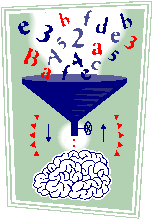
Monday, April 28













|
Home > Leadership in the Real World Blog | |
|
Notes, links, and inspiration about topics related to personal and leadership development. |
|
|
| |
Don't Confuse Me with the Facts!Whether it’s watching politics in the capitals of our countries or in the offices of our organizations, I continue to be amazed at how often our actions reflect the sentiment: “Don’t confuse me with the facts!”The Study A recently published study by Emory University brought this to light. Their research used functional neuroimaging (fMRI) to study a sample of devoted Democrats and Republicans during the three months prior to the 2004 United States Presidential election. The subjects evaluated threatening information about their favored candidate while the fMRI watched what parts of their brain were active. The results can be insightful for leaders. “When it comes to forming opinions and making judgments on hot political issues, partisans of both parties don't let facts get in the way of their decision-making, according to a new Emory University study. The research sheds light on why staunch Democrats and Republicans can hear the same information, but walk away with opposite conclusions.”  Turns out the reasoning portions of the brain weren’t lighting up during the testing. “Essentially, it appears as if partisans twirl the cognitive kaleidoscope until they get the conclusions they want, and then they get massively reinforced for it, with the elimination of negative emotional states and activation of positive ones,” according to Drew Westen, director of clinical psychology at Emory who led the study. Two key quotes from Westen in the article: • "…partisan beliefs are calcified, and the person can learn very little from new data.” • "Everyone from executives and judges to scientists and politicians may reason to emotionally biased judgments when they have a vested interest in how to interpret 'the facts.’” The Question Leader, let me ask you…. How many of your opinions and judgments are "emotionally biased" because of vested interests? My response: More than you may want to believe. Examples What emotional response do you have when you hear names such as George W. Bush, Hillary Clinton, Bill O’Reilly, Vladimir Putin, and Kofi Annan? What judgments have you made about topics such as abortion, privacy, evolution, intelligent design, etc.? Point in case: I’ve spent some extended time looking into the evolution vs. intelligent design debate. It’s astounding to me how otherwise very smart people can so vividly reinforce the point we’re discussing. An objective observer can rather easily see that both sides struggle with emotionally biased conclusions. The reality is both are theories. Both require “faith” (example: you have to either put your money on an eternal Being or eternal matter to explain how this all started, and the scientific method is woefully outmatched for either position). Both have vested interests in their conclusions. Most people I talk with about the topic are so “calcified” in their positions that I suspect Westen is correct they “can learn very little” from data. What’s a Leader to Do? Think about judgments you’ve made in your workplace. Think especially about the ones you get really charged up about. Consider also key judgments you’ve made in your personal life. Then consider this advice: Test your judgments. Ask, “What are reasonable facts that support my positions?” “What vested interest do I have in them?”. If faith is "being sure of what we hope for and certain of what we do not see”, realize there is far more faith in our judgments than we might want to admit. Faith is not simply the domain of religion. Many positions we hold in the workplace cannot be proven in a laboratory. Test your judgments. Ask, “Why would a reasonable, rational person come to a different conclusion?” We can easily slip into thinking people who take different positions are not reasonable or rational. Think about the person in the other department who doesn’t agree that your project is critical. Or your boss who is demanding the impossible. Or the customer who doesn’t like what you’re proposing. What if they were reasonable and rational? Why would they reasonably come to their conclusions or make their demands? What vested interests do they have in their positions? Ask, “If I had to argue their position, how would I do it?” Understanding the answers to these questions can help you more effectively influence them (as well as help you test your own judgments).  Cultivate true tolerance. There’s a lot of fluff out about tolerance. Some people who demand tolerance most loudly are some of the most intolerant people I know! Cultivate true tolerance. There’s a lot of fluff out about tolerance. Some people who demand tolerance most loudly are some of the most intolerant people I know!I find truly tolerant people don’t jump to character assassination to defend their position. They can respect a person without agreeing with their position. They understand the difference between conviction and preference. This is not a call for lack of convictions or full acceptance of all positions. It is, however, a call to at least be willing to accept critical feedback. To consider arguments for alternative approaches. To realize I’m not all-knowing and can learn from others. From a current events perspective, the unwillingness of evolution activists to allow strengths and weaknesses of their position to be taught in school is a telling sign of intolerance. Allowing reasonable debate on the topic would be a different sign. Similarly, from a workplace perspective, the unwillingness to truly consider critical thinking or feedback from your team, peers, boss, etc. can lead to devastating conclusions. If it’s “your way or the highway” in the workplace, ironically, the highway option might just be where you end up. Wrap-Up "The moment we want to believe something, we suddenly see all the arguments for it, and become blind to the arguments against it." George Bernard Shaw We are masters of rationalization, who too often buy on emotion and rationalize with logic. Remember this Emory University study the next time you get entrenched into an emotionally charged position. Be careful about blindly defending your vested interests. Leader, perhaps it’s time to run a decalcify cycle. Comments
I wholeheartedly agree with your posting. On the political side of things, it is hisheartening to see the polarization between parties. To some degree both parties suffer from this, but perhaps even more so the Democrats: putting party before country. That surely can only happen when minds stop reasoning and become calcified. I appreciate the blog on the real-world, and will go look for the Emory University study. I teach at a university, and have my Eng. 102 freshman students watching Bush's State of the Union address this evening. (I also expect to post the transcript on the class website by W morning's class). They will then check out through http://www.ipl.org (reading room, newspapers, Internet Public Library site) foreign press reaction to some of the key points. If I can get the Emory study today, I will also post that for class discussion. Course is Argument/Analysis/Research...
What you say here is very similar to George Lakoff's concept of moral framing. When facts contradict the frame, the facts are discarded. by Rich James, 1/31/2006 12:38 PM
To elaborate further on my previous post, while I disagreed with the particular example on evolution, I agree with the larger point. One could say we all operate on a level of "faith," a set of deeply embedded assumptions about how the world works, a light that illuminates what we see. by Rich James, 2/01/2006 1:45 PM
Thanks for the blog comments, Rich. I appreciate the clarification regarding the issue of eternal matter. This helps in my personal education on the topic. by Andy, 2/01/2006 5:19 PM teacherlearner, I'd love to hear how the analysis went for your class. Watching the post-speech analysis on TV and newspapers, I only find more reinforcement of the Emory study, not less. by Andy, 2/01/2006 5:58 PM |
|
|


